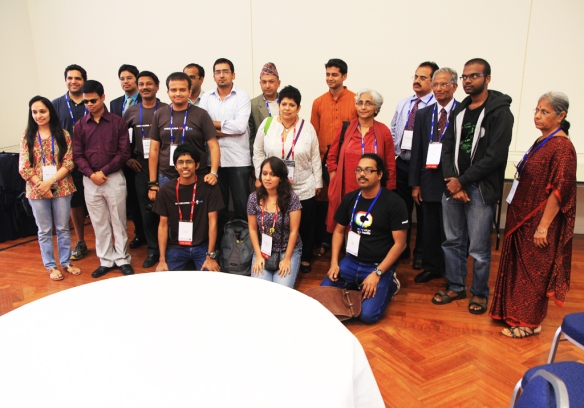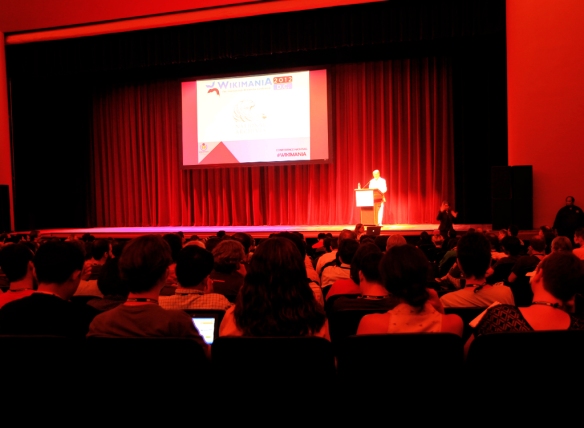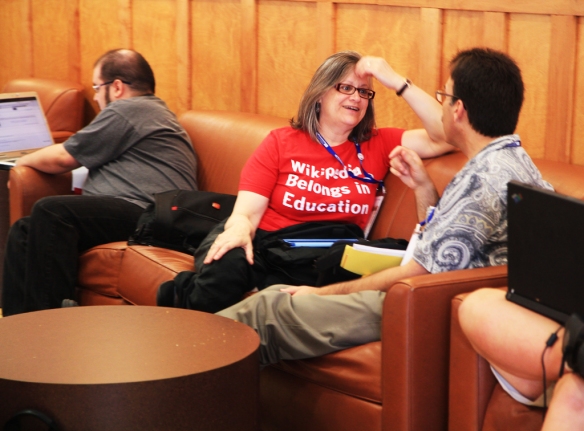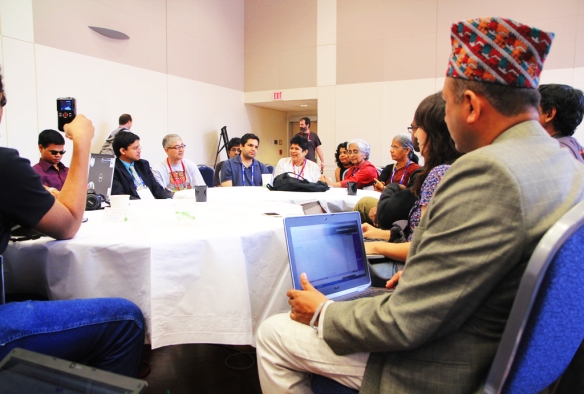WHY DO PEOPLE DEVOTE SO MUCH TIME TO WIKIPEDIA?
Wikipedia is a calling. That’s the impression I got from the Wikipedians I interviewed last weekend at the WikiMania 2012 conference, who had both a remarkable, singular passion for information, and a similar sense that their editing and administration – tirelessly, into the night – was setting them up for something grander than mere, banal nerder-ery.
We of the geek tribe like to talk of the singularity, the dramatic birth of a superior intelligence created by technological means. I have a sneaking suspicion that many Wikipedians are at least somewhat convinced they are already living it. They may or may not want to tell the rest of us.
How did the Wikimania 2012 crowd strike me? Much more diverse than I anticipated. There were more women than I expected, considering their proportionate rarity in the Wikipedia community – a mere 10 to 15% at last estimate. (Women are more well represented in the Wikimedia leadership ranks, for whatever reason). There were people of essentially every race there, representing 87 countries. Some appeared well into their 60s, and even 70s.
Of course, some of the old stereotypes about nerd-kind certainly held true. There were plenty of awkwardly dressed guys with somewhat suspect social skills and much more suspect facial hair, clutching their laptops like children. But the difference was that even Those Guys had a calling that went beyond modding Skyrim and arguing over the details of competitive Magic card playing (though there’s sure as hell some crossover). Wikipedians have to have a sense of mission. Otherwise, why bother?
Wikipedia is not the sexiest of hobbies. It is by its very nature incredibly, singularly anonymous – a really hard-core editor must have certain affectations. A hardcore editor must be able to thrive on relatively limited public renown and recognition.
This does not describe many of us – and this urge for relative privacy, or at least a willingness to work hard without much public accolade, is something that is quite incredibly bizarre in the Over Exposure Area. This is how they like it. They find all this fun. In fact, “fun” was one of the words I heard most often from Wikipedians. They are not just talking themselves into this.
This lack of publicity is also the source of many of Wikipedia’s problems with attracting new editors.
Wikipedians do know each other and of each other on the admin boards, but their discussions, as complex as they may be, rarely get any kind of private airing. Other than Jimmy Wales (who is seemingly everywhere – a Wikipedia Powerpoint address on attracting new editors I paged through mentioned the fell plague of “Jimmy Fatigue) they are a fairly quiet crowd, who are rarely contacted for comment by Anderson Cooper. On much of anything.
But they are many, and they are highly dedicated. It takes a certain kind of person to be this profoundly affected by the free dissemination of data. It takes a certain kind of pedant to devote so much of their life to the higher-cause of being Right. As a pedant with a vastly more developed need for publicity, public adulation, and financial remuneration than your bog-standard Wikipedian, I find this nothing short of commendable.

ARE WIKIPEDIANS GRUMPY AND CLOSE-MINDED?
You may have seen the study that found Wikipedians are “grumpy and close-minded.” In all honesty? It’s probably right.
Wikipedians are not just the nerdy kids, they are the nerdy kids who are particularly, desperately in love with the dual notions of order and correctness. There is something of the policeman and the prison warden about them – who else would spend much of their free time hovering over an article, waiting for some idiot interloper to come in and change a word in it to something that is wrong? Who else would spend hours writing and perfecting typo-correcting bots?
My friend Anirudh summed it up well, when he described his efforts to recruit new Wikipedians into the fold in India.
“Not everyone is made for it, just a few peole who want to get involved,” he said. “They’re everywhere. Every eccentric person around you. So it was these geeky kids I was looking for.”
Wikipedia’s main problem? It needs more of those geeky kids. It needs them to care.

MAKING MORE WIKIPEDIANS
What comes to mind first when someone mentions a “Wikipedia editor” in polite company? The Wikipedian stereotype is that of a slightly flabby pedant in a science-fiction t-shirt, crouched malevolently over a laptop his smothering mother bought him. He has got too much free time. He is not like most of us.
Karyn Gladstone, Wikimedia’s Director of Community Operations, is one of the people who has been tasked with fixing this.
Gladstone is athletic, well dressed, and has a magenta streak running through her hair: she does not in any way, shape, or form resemble a poorly socialized neck-beard. She also has enviable San Francisco nerd cred: she was working as a Drupal developer up until she came on board at Wikimedia, she told me.
Gladstone has been entrusted with the dual tasks of attracting more editors and attracting more women: tasks that happen to go together. To do this, she is running experiments with the site – tweaks, changes, and programs that will hopefully improve Wikipedia’s dropping roster of editors.
Wikipedia is, in many ways, a hostile social network – as was demonstrated by the researcher Yair Amichai-Hamburger. Amichai-Hamburger speculated that passionate Wikipedians, finding it hard to interface in the real world, turn to Wikipedia as an outlet – taking their somewhat truncated social skills with them.
“They are compensating,” he told a New Scientist reporter. “It is their way to have a voice in this world.”
And poor social skills often translate into conflict – and not conflict of a particularly polite or accommodating manner. A Wikipedia article, especially a popular one, often conceals a pointed battle beneath the placid, public service. Editors battle over rightness in a quiet, behind-the-scenes variant on the culture wars that compel us on television. This is not an environment likely to compel newbies who do not possess all the highly-specific traits of the true believers – and these are the people Wikipedia needs most.
“Some newbie comes in, they make a mistake, they get yelled at via impersonal nasty template message on a page they don’t even know they have and then their article gets deleted,” Gladstone told me. “So I have projects underway to get the messaging and reversion on deletion templates more straightforward.
There are many efforts underway to make Wikipedia somewhat nicer. Not saccharine. That’s not the point. Just something less of a tigers den than it currently. The Wikipedia Teahouse is one of them. The program hopes to provide a mentoring system for aspirant editors – and it’s also hoped to appeal to potential female editors. The Glam (Galleries, Libraries, Archives, Museums) also is drawing new users into the crowd, as it attempts to build up Wikipedia’s cultural content.
Gladstone is quick to point out that Wikipedia is fun – and you need not be a hardcore geek to come around to it.
“My team has done several editor motivation studies,” Gladstone tells me. “Unlike the stereotype you might have heard, it’s not some 15 year old white nerd boy in his parents basement People seem to get a lot out of editing Wikipedia.”
“They find self-expression, they enjoy looking at how many times something they wrote was viewed by other people,” she explains. “Sometimes we get the altruist in there who wants to save the world. Most people who edit Wikipedia regularly think it’s fun.”
Then there’s the problem of the editing system, which Gladstone quite willingly described to me as “kind of nasty.”
And it is. Wikicode is archaic, confusing, and bears little relation to the CSS and HTML the rest of us learned to write years ago.
It is pretty easy to learn, but most people who might otherwise be inclined to add to Wikipedia may not have the time or inclination to hunch over code for a while so they can weigh in. And they shake their head at the Terrible Wrong Thing in Wikipedia and leave it alone.

This is where the Visual Editor comes in. Gladstone described it as the “Messiah of fixing the editing experience.” She’s almost certainly right.
The Visual Editor hopes to make Wikipedia editing as simple a process as uploading a Blogger or WordPress post, and in the process, will draw in the unwashed masses. People appeared somewhat divided about this. There would be more editors – and Wikipedia would be saved.
But what will happen to the extant, incredibly dedicated tribe that currently exists? The entry bar will be lowered. Everyone will be calling themselves a Wikipedian, even if they just decided to fix some punctuation, or add a line to the Shackleton article, or whatever. To some, this may smack of obscenity.
But it is a matter of adapt or die. 80,000 active editors simply can’t hope to sustain 480 million readers forever – and the billion that Wikimedia hopes to reach in the next few years. 80,000 editors, even the best of the best, cannot catalog the entire wealth of world information alone.
WIKIPEDIA: IT’S GOOD ENOUGH FOR YOU
Chief Archivist of the United States David Ferrario was the closing speaker at Wikimania 2012, and it was quite obvious that he was taken with the Wikipedians in the audience. This makes sense: Ferrario’s National Archives recently hired its very first Wikipedian in residence, a mild-mannered 25-year-old library school student named Dominic McDevitt-Parks, who is leading an online archival information revolution.
“They knew well enough they wanted someone with Wikipedia experience, but didn’t know what they wanted the Wikipedian to do,” McDevitt-Parks told me: he has had to create the role himself, and has accomplished this by enlisting online volunteers to help tag information, hosting document scanning get-togethers for the public, and inviting Wikipedia users to ferret out the story behind historical images.
As a fellow millennial, I feel McDevitt-Parks is doing a remarkably good job of dragging a stodgy institution into the future – though it helps that the National Archives has been awfully amiable to the dragging process.

Ferrario backed up his institution’s fondness for Wikipedia at the closing gathering, piling praise upon the ranks of Wikipedians. “When I graduated from college, the Internet was an interesting DARPA project,” he told them, provoking peals of laughter from the crowd.
He described his realization – perhaps helped along by his status as a MIT grad – that the Archives had to adapt or die. It appeared to have been an easier ideological journey for him than for most members of the Boomer ilk (although there were a healthy contingent of over-60 Wikipedians attending Wikimania). “Our work with Wikipedia is changing how we think about own archival work,” he said. “Our biggest challenge is visibility. We need to be where the people.”
And he really brought the house down with this admonishment to other gate-keepers: “If Wikipedia is good enough for the archivist of the United States, it should be good enough for you.”
The crowd loved it. It might have been mildly pandering to present-company, but he was right. Just as Wikipedia must adapt-or-die, so must the government and our stodgiest, most Internet-resistant institutions, especially those in the business of disseminating knowledge. You want to reach the kids? Wikipedia should be Good Enough For You.

Ferrario also quoted Charles Van Doren in the course of his speech: “Because the world is new, the ideal encyclopedia is radical too.”
The quote is prescient. It reminded me of something Anirudh told me, when I asked him about Wikipedians relationship with the truth. Surely they must be slavish adherents to it, I asked him. Really into it.
No, said Anirudh. Not entirely.
“Wikipedia is not about the truth, it’s about verifiability, using secondary, reliable and independent sources,” Anirudh told me. “It’s about presenting ideas as they are.”
Presenting ideas as they are – and presenting the past to a worldwide audience that might otherwise ignore it – is the basic problem the Wikipedians face, that we all face. That the National Archivist of the United States faces.
Wikipedia is one remarkably powerful tool in the arsenal of the knowledge-evangelicals. Perhaps one of the most powerful. And I suspect we have yet to see the full extent of the Radical Encyclopedia’s power.
For instance: there are projects underway to not only extend Wikipedia to mobile phones but to make it free to use – and some telecommunications companies are getting behind it. In a world where the majority of humanity will access the Internet only via their mobile phones – well, that’s huge.
And that brings me back to the singularity.
I’ll refer to the Wikipedia definition of technological singularity: it’s the “hypothetical future emergence of greater-than-human superintellignece through technological means.”
It goes on: “Proponents of the singularity typically state that an “intelligence explosion”,[2][3] where superintelligences design successive generations of increasingly powerful minds, might occur very quickly and might not stop until the agent’s cognitive abilities greatly surpass that of any human.”
Well. Doesn’t that sound familiar.




Very interesting and informative – thanks for this!
This is really good writing. Keep that crazy fire burning, girl.
I was recommended this website by my cousin.
I am not sure whether this post is written by him
as no one else know such detailed about my trouble.
You are amazing! Thanks!